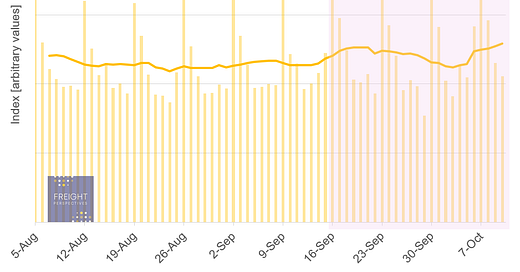Border Delays and Productivity: The Implications of Germany's New Control Measures
Market Monday - Week 42 - Border controls increase negative impact on productivity in transportation. Another component explaining the reduced capacity measured in the market.
The introduction of stricter border controls in Germany from September 16th has further strained the already reduced capacity in the transportation market. These new measures, which build on those implemented during the European Championships, have drawn significant criticism from the European Commission, neighboring countries, and the broader economy.
Four weeks after the implementation of this measure marks a perfect time to evaluate its impact. The following chart displays the development of daily average waiting times at German borders for inbound traffic.
Border Waiting Times Inbound Germany
Source: Transporeon Real-Time-Visibility
The chart displays a seven-day moving average, revealing subtle changes around September 16th. Contrary to expectations, the stricter controls did not dramatically increase waiting times as initially expected. Notably, the chart reveals peaks on Mondays, primarily due to delays at the Poland-Germany border, a more detailed analysis showed.
The Poland-Germany crossing experiences a surge in traffic at the week's start, as numerous Eastern European trucks embark on their westward journey to service Western European markets. This weekly influx creates a predictable bottleneck, contributing to longer waiting times. The recent ruling by the European Court of Justice in early October, which suspended the eight-week return obligation of the Mobility Package, is unlikely to alter this established pattern.
Comparing data from previous years helps identify differences relative to 2023 and confirms that the increase on September 16th was not coincidental or a seasonal fluctuation following the summer vacation period.
Border Waiting Times Inbound Germany
Source: Transporeon Real-Time-Visibility
The chart above confirms the differences from 2023 and highlights that waiting times at the borders were already elevated before September 16th. Additionally, the Monday peak was less pronounced in previous years compared to 2024. This phenomenon is likely linked to the border controls implemented during the European Championships, which have not been suspended, particularly at Germany's eastern borders.
What does this mean?
These developments pose challenges for the transportation market and its stakeholders, resulting in decreased efficiency and productivity. Carriers, in particular, may face increased operational costs. Our data reveals that compared to 2023, trucks entering Germany from Poland at the start of the week now encounter an additional hour of waiting time on average.
While these current measures do not constitute a major disruption to the overall transportation market, they do add another layer of complexity, limiting overall productivity and available capacity.
Christian Dolderer
Lead Research Analyst






